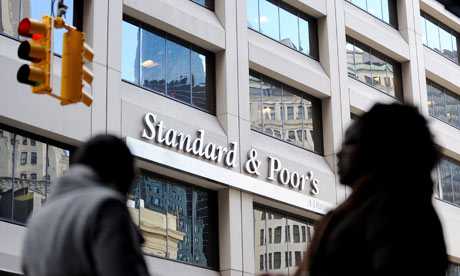By Emre Peker
ISTANBUL–One of the few bright spots in Europe, Turkey has bagged two credit-rating upgrades in as many years even as back-to-back debt crises have roiled world markets. Upgraded by Fitch Ratings to investment grade for the first time in two decades earlier this month, Turkish assets have surged to record highs amid growing investor confidence the economy has made the transition from perennial underachiever to regional superstar.
But on Wednesday, Moody’s Investors Service took some wind from Turkey’s sails, stressing that lingering economic weaknesses meant it wouldn’t bump Turkey to investment grade.
“If you told me years ago that there would be a global financial debt crisis and a euro-zone crisis on Turkey’s doorstep, and it would have come out of it fine, I would not have believed it,” said Sarah Carlson, a London-based Moody’s analyst who has been covering Turkey since 1995. Yet, she added during a conference in Istanbul, “There are still some challenges that remain.”
Turkey faces short-term financing risks due to lingering structural weaknesses, Moody’s said, despite the improvements of the past decade–when Turkey’s gross domestic product more than tripled to $780 billion, its debt ratio halved to 37% of economic output, and inflation slowed to single digits from more than 33%.
Added to the country’s large external imbalances is geopolitical risk, which may fuel international investors’ risk aversion and make it difficult to finance the country’s large current-account deficit, according to Moody’s. The events of the Arab Spring that culminated in the Syrian conflict is already spilling over the southern border of Turkey, a member of the North Atlantic Treaty Organization that may request Patriot missiles from the alliance to defend against threats from President Bashar al-Assad’s forces.
Meanwhile, even as the gap in Turkey’s balance of payments declined to $55.8 billion from a record $78 billion in October 2011, economists say it’s unsustainably wide at more than 7% of GDP and needs to be less than 5%.
“The current-account deficit has very strong structural elements to it, that means that beyond a certain point large reductions to the current account deficit become difficult without policy actions,” Ms. Carlson said.
Still, the markets largely shrugged off economic and diplomatic risks leading to the Nov. 5 by Fitch decision raising Turkey’s credit quality to investment grade, with the rating at BBB- with a stable outlook, and sending the benchmark Istanbul Stock Exchange 100 index and two-year government bonds rallying to record levels.
Moody’s, which rates Turkey one step below investment grade at Ba1 with a positive outlook and insists on stronger balance-of-payments, dampened hopes for a second upgrade that would have unleashed a flood of cash from fund managers, who typically require investment-grade ratings from at least two of the three leading agencies. Standard & Poor’s Ratings Services rates the country two steps below investment grade at BB with a stable outlook.
“Moody’s missed a trick,” said Tim Ash, head of emerging market research at Standard Bank Plc in London. “Disappointing given the Fitch move to investment grade a couple of weeks ago … I have given up trying to understand rating agency logic where actually paying one’s debts does not count for much–Turkey probably would be investment grade now, like Russia, if it had defaulted in 2000-2001 rather than paid. But there you go.”
Ankara did not immediately respond to the Moody’s decision but it is no secret that there is little love lost between Turkey’s policy makers and ratings firms.
Turkish cabinet ministers and central-bank officials have long bemoaned raters’ stance on its fast-growing economy, stressing that Turkey’s credit rating is too low. Ankara has repeatedly fulminated against Fitch Ratings, Moody’s and S&P’s, hurling accusations of an anti-Turkish bias in their sovereign-ratings analysis. After Fitch lowered Turkey’s outlook in November, Economy Minister Zafer Caglayan said the company couldn’t be independent since it was 60% owned by French investors.
In June, Turkey’s cabinet reacted furiously to S&P’s cut in Turkey’s outlook to stable from positive, with Prime Minister Recep Tayyip Erdogan accusing S&P of making an “ideological decision” and threatening to withdraw Turkey’s recognition of the agency as a legitimate credit institution.
Yet, Moody’s report is still broadly positive, forecasting that the economy will expand 3% this year and 3.8% in 2013 and suggesting that Turkey could secure a sovereign upgrade in the months ahead. During the same period, inflation will slow to 7.8% from 8% and the current-account deficit will drop to 7.4% of GDP from 7.8%, the New York-based firm’s forecasts show.
The country also is still subject to volatile growth cycles, Ms. Carlson said on Wednesday. Indeed, Turkey’s economic growth is slowing significantly from last year’s 8.5%, which was third only to China and Argentina among the world’s major economies.
But there’s still more to be optimistic about than with virtually any other European sovereign: Prime Minister Recep Tayyip Erdogan’s government can boast of rising financial strength backed by a strong balance sheet and declining public debt ratios that can withstand even more stressful economic circumstances than Moody’s expects, Ms. Carlson said.
“Turkey is the only country to have gotten two upgrades since the onset of the global financial crisis,” she said. “Turkey occupies a very special place in the ratings decisions we have taken in European countries in recent years…. Turkey is one of the good news stories coming out of Europe.”
-Yeliz Candemir contributed to this article.




